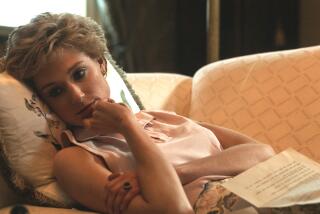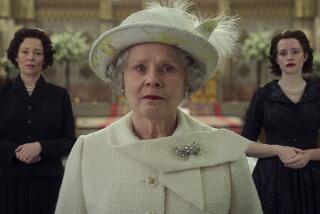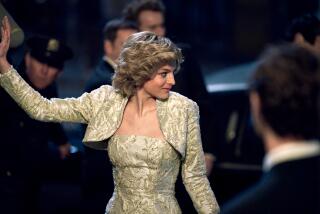Princess Diana’s ‘Question Authority’ Nature Appealed to Americans
- Share via
As an expatriate Englishman, I have always been a little bemused by Americans’ affinity for the royal family. It is a fascination seemingly born out of an obsession with celebrity and a reverence for anything older than a ’57 Chevy.
But this time, after Princess Diana’s death at age 36, I understand how Americans--from those signing a condolence book in Simi Valley last week to those I met in Ventura’s Victoria Pub the night she died feel.
That’s a strange admission because I never particularly liked the starchy royal family and even less the archaic system they represented.
But neither did the late Princess of Wales. And neither, as has become increasingly clear in the days since Diana’s death, do many other of my countrymen.
I was quite happy to emigrate from England in 1977, 14 years after being born just outside of London.
We were economic refugees, my mother seeing no future for her two sons in a country crippled with high unemployment and even rotating electrical blackouts.
And I didn’t particularly relish my immediate future, stuck in the regimented British educational system of school uniforms, teachers named “sir” and classes that seemed designed to produce compliant drones rather than thinking, questioning human beings.
So we left, in the year punk rock broke, with Johnny Rotten’s sarcastic rejection of a nation’s outmoded values embodied in the Sex Pistols’ version of the national anthem “God Save the Queen” ringing in my ears.
It’s no accident I ended up as a journalist, one of the few jobs that rewards a person for questioning authority. And it’s not surprising I would end up in Southern California, its anything-goes attitude about as far as you can get from the stiffly formal British society, where ingrained class differences remain important.
Princess Diana would have loved it here.
She couldn’t stand the stuffy reserve of the family she married into or the strict hierarchic structure of the aristocratic circles she was forced to move in. She was unwilling to become a dutiful member of an anachronistic institution like the royal family, seemingly incapable of realizing the world was changing around it. Its members may have been bound by convention, but Diana wasn’t about to be constrained by it.
So they pushed her out of their world and paid her off.
And she became more popular than any of them.
It was undoubtedly partly intentional, an attempt to show the royal family how 20th century royalty should act. But there was a sincerity to her actions unusual in these days of self-serving celebrity.
Diana wasn’t faultless--her highly publicized flirtation with a married rugby star caused considerable consternation in England. But her flaws only endeared her further to those who could identify more with a less-than-perfect princess than a distant monarchy.
The royal family appeared to prefer isolation from its subjects, staying in remote castles and tramping about on wind-swept Scottish heaths or hiding from the masses behind pomp and pageantry.
We could better identify with Diana’s idea of fun, which included sailing on exotic yachts and partying with the rich and famous but did not detract from her obvious devotion to her sons.
She reached out to the downtrodden and needy, AIDS patients and children, who were as much victims of circumstance as she, as helpless and abandoned by their society as she was by hers.
She showed England, the world and those who had rejected her what royalty could and should become if it is to be accepted as more than a sort of garish theme park frozen in time for the benefit of tourists.
I was working that Saturday night she died. An editor rang up, saying, “Sorry about your princess.”
But Diana belonged to more than the British.
She was, as Prime Minister Tony Blair later accurately observed, the “people’s princess.” And he tellingly didn’t call her the “English people’s princess” either. Because the fascination with Diana ran almost as deep here as in Britain.
When I went to the Victoria Pub after work that night, the most heartfelt reaction to Diana’s passing came not from a fellow Brit but from an American.
She had cried when the news was announced, Alicia Estrada admitted. She was in eighth grade when Diana married Charles, and she, like so many other women, vicariously lived through that storybook wedding.
She also felt the pain of the failed marriage, Diana’s ostracism from British society and her apparent happiness with Dodi Fayed, the Egyptian playboy she was dating.
“I was excited for her--I was excited for her new life,” she said. “The only thing I can say about it is that they died together.”
One pictures the almost future Queen of England in love with Fayed, himself a nouveau riche outcast in snooty British society. And maybe even spending time in open-minded Malibu, where Fayed owned a mansion.
Now that would have been the ultimate act of rebellion.
More to Read
Sign up for Essential California
The most important California stories and recommendations in your inbox every morning.
You may occasionally receive promotional content from the Los Angeles Times.










